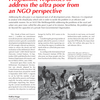Programme responses to address the ultra poor from an NGO perspective
Programme responses to address the ultra poor exist on various levels. Although frequently criticised, the adoption of the Millennium Development Goals has at least led to National Poverty Reductions Plans and Strategies in a large number of countries. Programme responses to address the ultra poor exist on various levels. Although frequently criticised, the adoption of the Millennium Development Goals has at least led to National Poverty Reductions Plans and Strategies in a large number of countries. Specific approaches by NGO can be integrated into a larger national frame. This may result in rather substantial progress on grass root level without reducing the overall responsibility of a national Government.
With a self-help approach it is possible to assist in a sustainable manner those ultra poor who are able to work, who own a minimum of assets and who are actively participating in adequate capacity building. National Poverty Reduction Strategies may contribute to the alleviation of structural poverty and hunger if the self-help potential of poor people is considered and encouraged.
Although NGO can make substantial contributions in developing adequate responses to address ultra poor it is the final responsibility of governments to provide the necessary aid in form of social welfare schemes, pensions or feeding programmes to help the ultra poor either to survive or to get them out of the poverty trap.
Mathias Mogge
Head Quality Management
Mathias.Mogge@welthungerhilfe.de
Hubertus Rüffer
Emergency Coordinator
Hubertus.Rueffer@welthungerhilfe.de
Welthungerhilfe
Bonn, Germany




